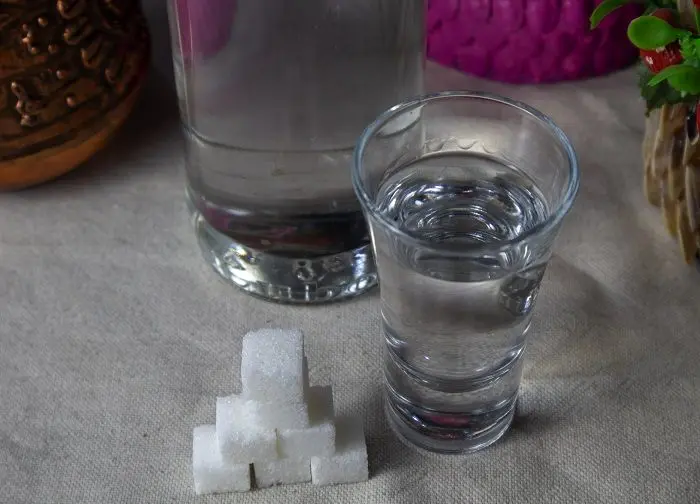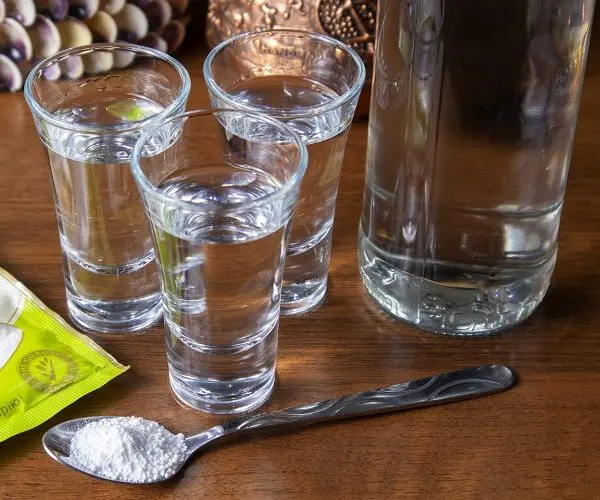In the budget price segment, soft vodka is the exception rather than the norm. But the taste of the drink can be significantly improved by introducing simple additives, most of which correspond to vodka GOST and are part of expensive brands.
We will proceed from the conditions that you need to soften vodka quickly and with affordable means (without bonifiers and other essences), while the organoleptic properties of the drink (color, aroma and taste) should remain exactly vodka, that is, it will not be a tincture. In this case, there are only three options: cool, sweeten, acidify, or combine these three methods.
Ways to make vodka softer
1. Freeze. The easiest option. The cold dulls the taste buds and masks the unpleasant aroma. The classic rule applies: the worse the quality of vodka, the lower the temperature of its serving should be.
It is enough to leave the bottle for several hours in the freezer of the refrigerator. More or less normal vodka should not freeze. If ice appeared in the bottle, it means that the fortress is lower than the declared 38-40% or there are a lot of impurities in the composition. In any case, you should not drink such a substitute.
Sweeteners
2. Sugar. Found in every kitchen, in the right quantities it softens vodka well, but can give cloudiness, and in case of poor quality, it can also give an unpleasant smell. It is advisable to use refined beetroot, which must first be crushed or ground with a coffee grinder into powder (optimal) and smelled before adding to vodka. If there is no unpleasant smell, everything is fine.
Quantity: 0,3-0,5 tablespoon per 1 liter of vodka.

3. Glucose or dextrose. The best option, since these substances have a minimal effect on the organoleptics of vodka, expensive brands are softened with dextrose in production.
Glucose is sold in pharmacies in ampoules of 20-40% aqueous solution. Dextrose comes in the form of powder and tablets, the form of release does not matter.
Dosage: 5-15 ml of glucose (20-40%) or 1-3 g of dextrose per 1 liter of vodka. If the release form is a tablet, they must first be crushed into powder.
4. Fructose. In most cases, it is not used because of too high sweetness (fructose is 1,8 times sweeter than sugar), but is sold in stores and supermarkets, so if you can’t get dextrose or glucose, you can use fructose.
Quantity: a maximum of a third of a teaspoon of fructose per 1 liter of vodka.
5. Food glycerin. He is the additive E422. The advantage of glycerin is that it does not give a third-party flavor and does not change color, only slightly softening the taste of vodka by sweetening. The disadvantage is the same as that of fructose – it is difficult to accurately calculate the proportion for a small amount of drink.
Dosage: 1-3 ml of glycerin per 1 liter of vodka.
Acidifiers
6. Ascorbic acid. Crystalline powder with a characteristic sour taste, which dissolves well in alcohol and water, making vodka softer without precipitation. Sold in pharmacies in the form of powder or dragee. The main thing is to buy pure ascorbic acid without additives.
Quantity: 2-4 g of ascorbic acid per 1 liter of vodka.
7. Citric acid. The most affordable acidifier, when properly applied, acts no worse than ascorbic acid, although it can give a barely noticeable cloudiness.
Dosage: 2-4 g of citric acid per 1 liter of vodka.

How to soften vodka
The correct technology for adding substances will not spoil the entire batch of the drink:
- Assess the aroma and taste of vodka. To suggest what additives are available that can make the drink better: you need to slightly sweeten or acidify the drink. If several substances will be used at once, then it is better to start with sweeteners.
- Pour 100 ml of vodka into another container. In 2-3 passes, add a sweetener or acidifier, starting with the minimum dosage. Stir, wait for complete dissolution, after 4-5 minutes, evaluate the taste.
- When the taste suits, recalculate the number of additives for the entire volume of vodka.
- After adding the substance, close the bottle tightly. It is advisable to leave vodka for at least a few hours (optimally 3-4 days) in a dark, cool place to stabilize the taste (end of chemical reactions).
PS If, nevertheless, too much softener is added, then you can reduce the concentration of the substance with another vodka or pure ethyl alcohol diluted with water to 40-50%.









